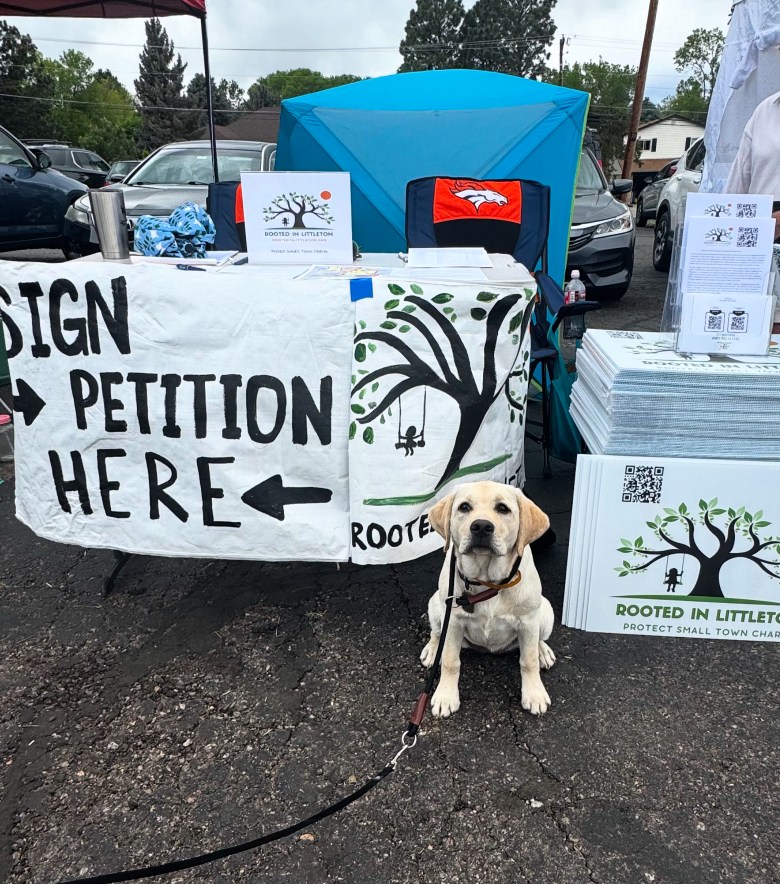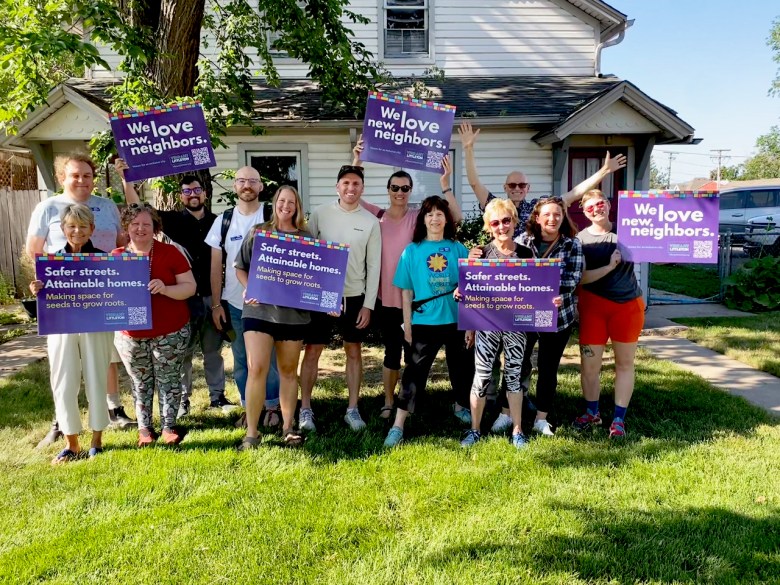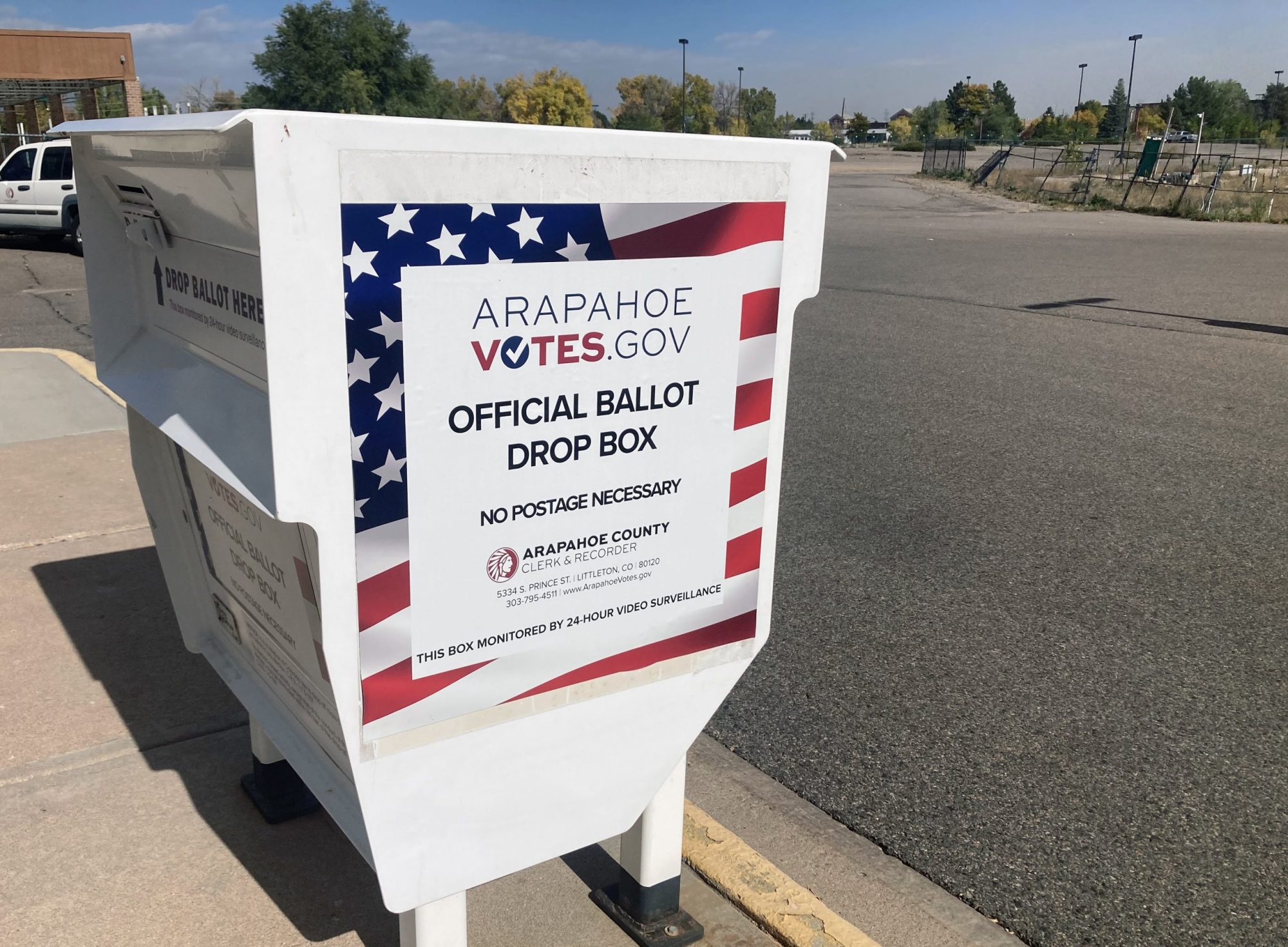The 2025 Littleton general election is approaching and two nonprofit groups have come to the forefront of the conversation concerning Littleton’s future.
Rooted in Littleton is a 501(c)(4) that got its start in January 2025, previously known as Save Old Littleton. The group aims to “protect the natural charm, livability and beauty of our core neighborhoods by advocating for thoughtful, community-first planning — and pushing back against unchecked high-density development,” said Erica Jagger, Rooted in Littleton’s public relations and marketing manager.
Vibrant Littleton is a 501(c)(3) organization founded in 2020. Its goals include “educating and advocating for Littleton policies which support safer streets, attainable homes, thriving public schools and strong nearby businesses,” said Patrick Santana, the group’s executive director.
While both Rooted in Littleton and Vibrant Littleton are nonprofit entities, each holds different statuses that impact how the groups can or cannot engage in political actions, such as campaigning.
Rooted in Littleton is permitted to participate in political activities, including lobbying and endorsing candidates, so long as it is not the main purpose of the organization, according to Inside Philanthropy.
In contrast, Vibrant Littleton’s status does not allow for it to engage in political candidate races, fundraising or campaigning, and the organization must remain nonpartisan.
Both organizations spoke with the Littleton Independent about the upcoming November election, their funding and vision for the future of housing in Littleton.
Editor’s note: The Littleton Independent organized the Q&A responses by alphabetical order, with Rooted in Littleton falling first alphabetically, followed by Vibrant Littleton.
What is your goal for Littleton and the upcoming election?

Rooted in Littleton: Our top priority is passing the charter amendment on this November’s ballot. This amendment will ensure that any plans to increase density in Littleton are backed by thoughtful planning and meaningful community input. This amendment gives us time to assess whether we truly need more than the 6,500 new housing units projected in the city’s Envision Littleton Comprehensive Plan.
Our broader goal is to return power to the people of Littleton. Too often, major decisions have been made without adequately reflecting the will of our residents. We’re working to change that.
Vibrant Littleton: Our goals are educating and advocating for Littleton policies which support safer streets, attainable homes, thriving public schools and strong nearby businesses. In this upcoming November election, Vibrant Littleton seeks to help Littleton citizens better understand the implication and impact of upcoming ballot measures, such as increasing the city’s debt limit and a proposed referendum to restrict residents’ land use options, increase city operating costs due to costly mailings, and which could potentially involve the city in litigation.
How will your approach affect housing affordability and the availability of homes for different income levels — young families, seniors and essential workers?
Rooted in Littleton: Our primary goal is to preserve the small-town charm and beauty of Littleton for future generations, not just for today. Knee-jerk reactions to current housing issues won’t lead to thoughtful, long-term solutions. That’s why we are advocating for a more inclusive process — one that genuinely represents all voices in Littleton, not just the few who have secured positions of power.
We’ve personally knocked on hundreds of doors and invested our own resources to conduct a professional survey to better understand what the people of Littleton truly want. Our survey showed that while most residents support finding solutions to housing affordability, they are strongly opposed to widespread upzoning that could damage neighborhood character and fail to provide real affordability.
Vibrant Littleton: We are people who know firsthand why it’s important to have a quantity and diversity of housing options in our city.
We view efforts to allow additional uses like backyard cottages, duplexes, condos and townhomes – often referred to as missing middle homes – in our residential neighborhoods as being well-aligned with our community’s stated housing goals.
The years-long discussions with stakeholder groups, planning commission and city council around missing middle homes was titled Neighborhood Housing Opportunities (NHO). The primary intent was to provide more diverse housing options; NHO was not proposed to resolve housing affordability, though additional housing options can provide some relief. Affordability is a complex question, affected by many factors. Council has targeted this issue using other ordinances, such as the 2023 Inclusionary Housing Ordinance.
If diverse home options do not exist, then they can’t be attainable, so permitting them is an essential first step. The counter-approach, which would not permit varied residential uses, reduces the diversity and availability of housing options, a direct contradiction to our Comprehensive Plan’s stated housing goal.

What evidence or data supports your position on whether increasing or restricting housing density will improve or worsen affordability in Littleton?
Rooted in Littleton: Neither the mayor nor the city council have presented a concrete plan specifically aimed at increasing affordable housing in Littleton. Instead, during city council meetings, their proposals have focused on increasing housing density, which they claim could potentially lead to more affordable options in the future. They also acknowledged in these meetings that Littleton’s current practice of allowing missing middle homes to be demolished and replaced with duplexes — often priced about 50% higher — does not improve affordability.
However, city council members have asserted that over time, market forces of supply-and-demand will drive down the prices of these new, initially more expensive homes. According to this view, the increased housing supply will eventually lead to greater affordability in Littleton. Yet, this has not been the outcome in other neighborhoods near downtown Denver, where similar price increases have fueled widespread gentrification and displaced many longtime residents, as seen in areas like Five Points, Whittier, Highlands and others, according to articles by the Denver Post and Westword.
Studies have shown that upzoning can raise land values and home prices. Research from MIT found that upzoning in Chicago increased housing prices, rather than lowering them. Our survey also reflected skepticism from residents about whether proposed density increases would result in meaningful affordability gains.
Vibrant Littleton: As covered in detail by the Colorado Sun, restrictive zoning regulations contribute to worsening housing affordability. Large minimum lot sizes are one culprit. In Littleton, for instance, 39% of residential land has a minimum lot size of at least two acres.
The lack of smaller missing middle home types such as condos and townhomes is another data point cited in the (Colorado Sun) article: “In April, the median condominium or townhome sold for around $400,000, according to the Colorado Association of Realtors. That’s $200,000 less expensive than the median single-family home sold that month.”
Littleton’s current zoning rules prohibit condos and townhomes across the vast majority of residential districts. So we, like other Colorado communities, are subject to this negative housing price impact cited in this data point.
More homes reduce housing costs, as seen in Austin and Minneapolis, where zoning reforms allowed missing middle homes. This also increases housing options without accelerating neighborhood change, offering new families access to previously unaffordable areas.
What is your stance on local versus state control over zoning and housing decisions, and how should conflicts be resolved?
Rooted in Littleton: We support maintaining Littleton’s home rule authority over zoning decisions. While we recognize the state’s goal of addressing housing shortages, we are concerned about one-size-fits-all state mandates like HB24-1152 that allow ADUs by right without sufficient local input. We believe conflicts should be resolved through collaborative efforts that respect both local voices and state-level housing objectives.
Vibrant Littleton: We recognize that housing challenges are not limited to a single neighborhood, a single city or a single region. Most of the 887 new employees of Littleton’s new Costco are likely people currently residing outside of Littleton, but who would prefer to have a home near where they work. A radiologist currently living in Morrison who works at Littleton Adventist Hospital might seek a home in Littleton for nights when she’s on-call. A young couple with a 3-year-old child currently renting a Commerce City apartment might want a condo or townhome in a Littleton neighborhood for its excellent school district.
Vibrant Littleton supports efforts by elected officials at every level of government to address housing challenges. As an organization, we look at specific housing policies and regulations — be they local, county, state or federal — and consider whether these measures help or hinder solutions. The academic question of who has jurisdiction is far less important than the real-world question of: will said policy help or harm? People want good outcomes from government actions and they especially want policies which expand their options and lower their costs. We don’t want to see leaders trying to score points about political jurisdiction. Rather, citizens expect civic officials to deliver solutions and positive outcomes — regardless of what level of government those solutions originate.
How do you envision Littleton meeting its housing needs over the next 10 to 20 years?
Rooted in Littleton: According to the city’s comprehensive plan, Envision Littleton, we are way ahead of our 20-year plan to build 6,500 new homes by 2040. We envision meeting future housing needs through a combination of preserving the character of existing neighborhoods, encouraging ADUs in appropriate areas, and focusing new development in underutilized commercial zones and along transit corridors. This approach balances growth with infrastructure capacity and neighborhood quality of life.
Vibrant Littleton: When Littleton was first platted by Richard Little in the 1870s, no one knew what the future would hold. In the early 1940s, Littleton had a community of 2,244 people, and by 1960, Littleton would quadruple in size to over 13,000 residents. By the year 2020, Littleton’s population had tripled again to 45,000 residents – and at every stage of this journey, people would describe our city as a small town and a wonderful place to live. These figures show that there’s no magic number of residents that make a city a great place to live.
What matters is that our city and its leaders effectively help Littleton solve the challenges of its time, whether that time is 1885, 1955 or 2035. It’s not about Vibrant Littleton’s envisioning, or predicting the future. Our organization focuses on ensuring that our community and its leaders have the tools they need to solve the challenges of their time — be those housing, transportation or fiscal challenges. We oppose measures which handcuff our leaders and our community by locking us to some fixed point in time or single, simplistic solution – forever. We question the hubris of anyone claiming to know precisely what’s needed for our city’s future.
What data, studies or real-world examples inform your position on the effects of increased density or preserved single-family zoning?
Rooted in Littleton: Our March 2025 Littleton housing survey found that a majority of residents are concerned that indiscriminate upzoning could decrease neighborhood livability without providing true affordability. Nationally, the MIT Chicago study and outcomes from cities like Minneapolis have shown mixed results when it comes to affordability gains from upzoning.
Vibrant Littleton: Littleton has always been a city composed of diverse housing types. Our oldest residential structures are duplexes and four-unit homes, dating from the late 19th century. People in Littleton lived clustered around our core downtown and Main Street on small parcels, with daily needs easily traversed on foot, bike or horse, enlarged with transit connections to Denver by street car and locomotive passenger trains. The small-town character of our community continues to draw upon the richness of this kind of diversity of home types, transportation options and walkable accessibility.
The real world examples of the positive effects of this traditional Littleton approach, or pre-1960’s zoning, are all around us to see. Especially in the parts of our city where we experience the deepest sense of small-town charm: our old downtown with its wonderful mix of townhomes, duplexes, backyard cottages, rooming houses, businesses on the ground level — none of them burdened with seas of asphalt parking lots surrounding them, with transportation options like the rail and bus routes that connect through this area.
We don’t need anything more than our own experience of this to know the positive effects of re-legalizing what created the heart of small town Littleton: A diversity of home types near businesses accessible by foot, bike or train.
How are you fundraising? Is there a specific dollar amount set as the fundraising goal?
Rooted in Littleton: We’re currently raising funds through our website, where supporters can contribute at any level. While we haven’t set a public fundraising target, every donation — large or small — directly supports our outreach, education and advocacy efforts. It’s a grassroots movement, and every dollar helps us keep neighbors informed and engaged.
Vibrant Littleton: As a 501(c)(3) nonprofit, Vibrant Littleton is funded via fully tax-deductible contributions from individual donors and, very occasionally, small foundations.
As reported on our IRS Form 990, Vibrant Littleton has annual revenues less than $50K. Far less, in fact. To date, the largest donation Vibrant Littleton has ever received from an individual donor was $110. We have received only two foundation grants — one grant for $500 and another grant for $226, which helped fund our Mailchimp account for one year.
Vibrant Littleton’s total operating budget for 2024 was less than $1,500. We do not have a fundraising goal for 2025, and we don’t generally set fundraising goals. Vibrant Littleton doesn’t have paid staff, doesn’t use paid consultants and has no assets — and never has had any of these.
Will you plan on endorsing any candidates this November?
Rooted in Littleton: Yes. We plan to endorse candidates in the coming months who are deeply committed to serving Littleton’s residents, prioritizing transparency and preserving the small-town charm that makes our city unique. We’re excited to support leaders who listen, lead with integrity, and are focused on long-term, sustainable solutions for our community.
Vibrant Littleton: No, Vibrant Littleton has never, cannot, and will not endorse candidates in any election. Unlike political partisan 501(c)(4) organizations, Vibrant Littleton is not allowed to support or assist campaigns for elective office. Vibrant Littleton has no intention of doing so – now or in the future.



The answers provided by Vibrant Littleton to your questions are inconsistent and contradictory.
The average salary of a radiologist in Colorado is $362,742. She can easily afford a single-family home in Littleton. A home she might buy here would be her second. Her occasional use of that property would do nothing to fill Littleton’s elementary and high school classrooms. Her offer to purchase that condo or townhouse would compete against one made by that Commerce City family whose child would help fill a Littleton classroom further raising the price.
The historic pattern of development in Littleton’s downtown cited by Vibrant Littleton emphasizes the importance of locating multifamily housing within easy walking distance of downtown stores and public transit routes. Most neighborhoods in Littleton don’t meet those criteria. Creating multifamily units far from public transit routes necessarily brings more, not less, motor vehicle traffic into Littleton.
Vibrant Littleton states: “We oppose measures which handcuff our leaders and our community by locking us to some fixed point in time or single, simplistic solution – forever.” This is absurd. City Council leaders are elected to represent the majority of citizens in their constituencies – that is democracy. We do not elect them to force their opposing points of view upon the majority of citizens.
Additionally, re-zoning aspects espoused by some City Council leaders will NOT result in more affordable housing in established single family neighborhoods. Affordability is constituted as the ability to purchase a property at the market price. Market supply and demand determine price, not City Council leader manipulations to re-zone single family residences in established Littleton resident neighborhoods.